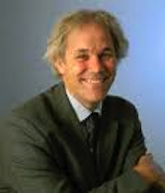Mark Solms PhD is best known for his discovery of the forebrain mechanisms of dreaming, and his pioneering use of psychoanalytic methods and theories in contemporary neuroscience. Born in L’deritz in 1961, he was educated at Pretoria Boys’ School and the University of the Witwatersrand, Johannesburg, South Africa. He moved to London in 1988, where he worked at the Royal London Hospital (Dept Neurosurgery) while he trained as an analyst at the Institute of Psychoanalysis. He returned to South Africa in 2002, where he now holds a Professorship in Neuropsychology at the University of Cape Town.
He is president of the South African Psychoanalytic Association, member of the British Psychoanalytical Society, and Honorary Member of the New York Psychoanalytic Society. Honours include the George Sarton Medal for contributions to the history and philosophy of science (Rijksuniversiteit Gent, 1996), the International Psychiatrist award for contributions to American psychiatry (American Psychiatric Association, 2001) and the Sigourney Prize for contributions to psychoanalysis (2012). He has published more than 250 chapters and articles in both neuroscientific and psychoanalytic journals, and five books, including The Neuropsychology of Dreams (1997), Clinical Studies in Neuropsychoanalysis (2000) and The Brain and the Inner World (2002). His last book was a bestseller and was translated into eight languages. He is the editor of the Revised Standard Edition of the Complete Psychological Works of Sigmund Freud (24 vols) and the forthcoming Complete Neuroscientific Works of Sigmund Freud (4 vols).
Check out the following Psychology CE Courses based on listening to Shrink Rap Radio interviews:
Jungian Psychotherapy Part 1 (6 CEUs)
Jungian Psychotherapy Part 2 (7 CEUs)
Jungian Psychotherapy Part 3 (7 CEUs)
Jungian Psychotherapy Part 4 (6 CEUs)
Jungian Psychotherapy Package of the Four Above (26 CEUs)
Wisdom of The Dream (4 CEUs)
Positive Psychology (6 CEUs)
Pros and Cons of Positive Psychology (5 CEUs)
CERTIFICATE PROGRAM IN POSITIVE PSYCHOLOGY (32 CEUs)
Body-Mind: Goodbye to Dualism (6 CEUs)
Spirit-Meditation: Nurturing The Inner World (8 CEUs)
Get our iPhone/Android app!
A psychology podcast by David Van Nuys, Ph.D.
copyright 2012: David Van Nuys, Ph.D.
Podcast: Play in new window | Download
Subscribe: Apple Podcasts | RSS

Hey Dr. Dave:
I agree that this may be one of your best interviews to date. Dr. Solms’ extensive knowledge of neuroscience really brought me up to date in the areas of my interest:. I feel like I’ve just take a course in Advanced Neuropsychoanalysis from a brilliant scientist. Where else but here on SRR could I find such a gem? Thanks again.
I was a little bit confused by some of the ways that Dr. Solms analogized Freudian concepts to neurological structures. He referred to the Id, for example, as the theoretical analogue to part of the brain that deals with basic embodiment and physical needs/desires. Yet the Freudian Id is much more than that — it is where all of our irrational, aggressive, conflictual and otherwise forbidden drives run free. Similarly, when discussing repression, Dr. Solms presented interesting evidence for “motivated forgetting.” However, the types of forgetting that Dr. Solms discussed had largely to do with conscious experiences later forgotten, than with unconscious feelings, desires and impulses repressed from consciousness. Though I found the talk interesting, I was ultimately disappointed with how Dr. Solms seemed to simplify and distort Freudian ideas in order to fit the contemporary neurological approach.
Just started catching up after uni study, and wow, what an episode to come back on! I’d rank this as one of the most important, along with #300 and Shedler’s episode, and I’ll be sharing this with some fellow university members.
I liked how Mark advocated giving credence to subjective psychic experience, something of which Jung was also an advocate; although his conflict was more in the face of physical sciences rather than the more modern dilemma that comes from a Behaviourist perspective.
Just going on the last comment, I’m not sure there really is a genuine issue with over-simplification of Freudian ideas so long as we keep in mind Mark’s comment about working with ‘Freud’s broad strokes’. Given how often Freud seemed to revise and re-work his own material, and how many very large changes were proposed by peers such as Adler, Spielrein, Jung, Stekel, Klein and the like, viewing Freud’s original theories too concretely would probably be unwise. (Using the software development world for analogy, I guess a suitable likening of Freud’s work would be that of early alpha software that is subject to updates before completion). While original-Freudian theory would have some disagreement, ultimately I’m not sure there’s any real conflict.